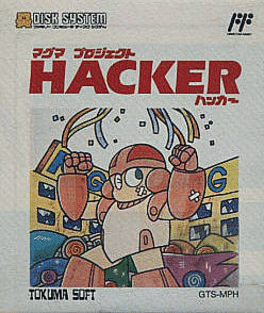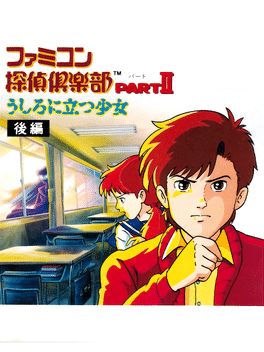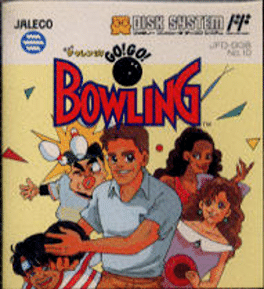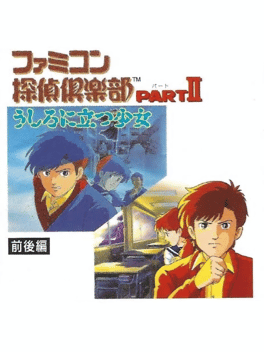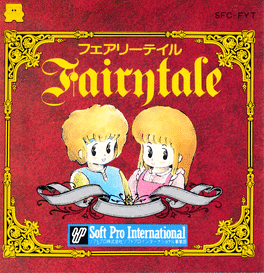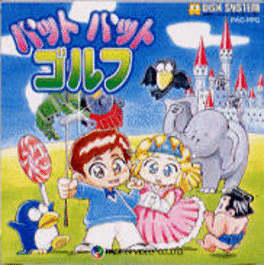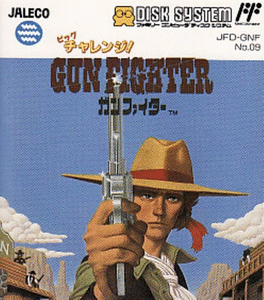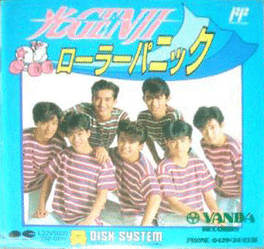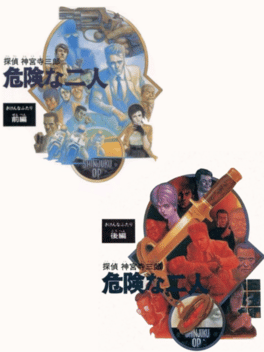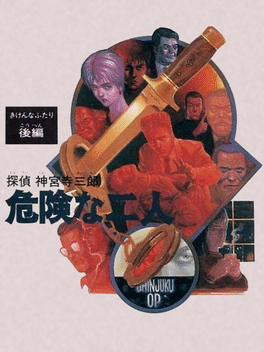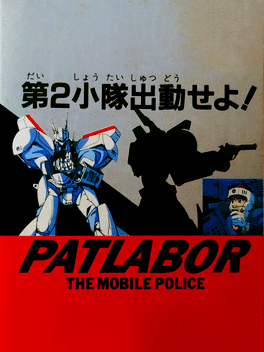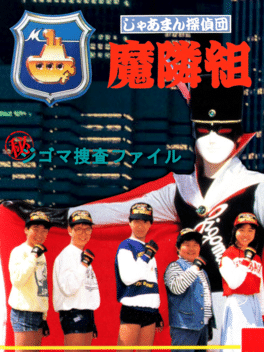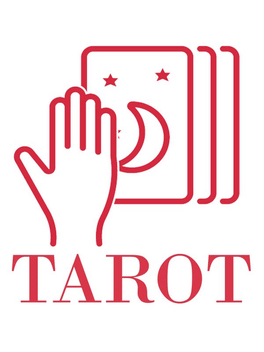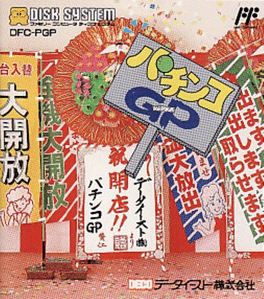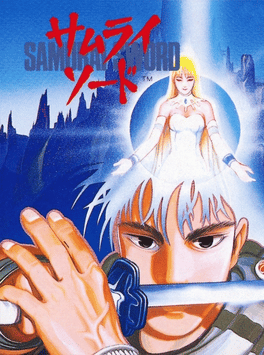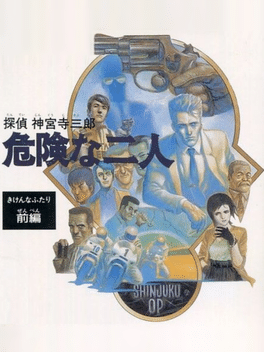New Fds Games - Page 2
-
Magma Project Hacker
1989
Magma Project Hacker
1989
A Japanese RPG loosely adapted from the 1985 Activision PC game Hacker. The player character uses a robotic fighter to hunt for clues behind a global conspiracy. Magma Project Hacker is a sci-fi themed RPG and an adaptation of the 1985 PC/Amiga/Atari ST strategy game Hacker. As with the Famicom Disk System adaptation of Monty on the Run, a considerable number of liberties were taken with the game's themes practically transforming it into a completely different game. Ironically, the story more closely resembles another western PC game, Captive, with its plot. The player character witnesses a murder and is told to seek information on a shadowy organization known as the Magma Project by the dying victim. In order to effectively hunt for clues, the player character uses a device to activate a robot on the other side of the planet and employs the robot's various combat and exploration functions to track down the Magma Project. -
Famicom Tantei Club Part II: Ushiro ni Tatsu Shoujo - Kouhen
1989
As a young detective (whom you name yourself), you work as an assistant for the famous investigator Utsugi. Your first important assignment is to investigate a murder case. A girl named Yoko was found murdered near a central bridge. During the investigation, you discover a strange rumor about a mysterious ghost-like "girl who stands at the back", spread around the school Yoko studied at. Soon the young detective realizes that the case grows more and more complex and that he will need all his wit and talents to find the criminal! This adventure game is dedicated entirely to investigation. You have a menu with various choices (Talk, Investigate, Think), as well as multiple topics to ask the suspects about. You should find clues by questioning people and gathering information, but also by examining areas - in certain places you should move a hand-like cursor over the screen and click on a precise spot to examine it. -
Big Challenge! Go! Go! Bowling
1989
Enjoy realistic bowling like you never experienced before! Speed, curve, aim, STRIKE! -
Famicom Tantei Club Part II: Ushiro ni Tatsu Shoujo - Zenpen
1989
Famicom Tantei Club Part II: Ushiro ni Tatsu Shoujo (also known as Famicom Detective Club: The Girl in Back) is the second game in the Famicom Tantei Club franchise. It is a prequel to the first game, Famicom Tantei Club: Kieta Koukeisha. The game was originally released on two discs for the Famicom Disk System, the first disc released on May 23, 1989 and the second disc on June 30, 1989. The game was later redistributed as a Super Famicom game (with improved graphics and sound, added gameplay mechanics, and other minor changes) through Nintendo Power on April 1, 1998. On August 10, 2004, the game was released under the Famicom Mini Series for the Game Boy Advance (the Famicom Disk System version). The Super Famicom version was also released for the Virtual Console on April 30, 2008. Famicom Tantei Club Part II was developed by Nintendo R&D1 and published by Nintendo. -
Famicom Tantei Club Part II: Ushiro ni Tatsu Shoujo
1989
As a young detective (whom you name yourself), you work as an assistant for the famous investigator Utsugi. Your first important assignment is to investigate a murder case. A girl named Yoko was found murdered near a central bridge. During the investigation, you discover a strange rumor about a mysterious ghost-like "girl who stands at the back", spread around the school Yoko studied at. Soon the young detective realizes that the case grows more and more complex and that he will need all his wit and talents to find the criminal! This adventure game is dedicated entirely to investigation. You have a menu with various choices (Talk, Investigate, Think), as well as multiple topics to ask the suspects about. You should find clues by questioning people and gathering information, but also by examining areas - in certain places you should move a hand-like cursor over the screen and click on a precise spot to examine it. -
Fairytale
1989
Fairytale
1989
A strategy game about a group of children going to battle against an army of pigs that has suddenly appeared near their village. The children and pigs take turns moving around a map before going into semi-real time turn based battles. A cute but surprisingly difficult game and the last of Soft Pro International's releases for the Famicom Disk System. -
Putt Putt Golf
1989
Putt Putt Golf
1989
Putt Putt Golf by Pack-In-Video is one of many golf games for the Famicom and the Famicom Disk System, but one of the few to take players through an abstract world rather than an approximation of a real golf course. The goal of each stage is to reach the hole on the green and pot the ball in as few strokes as possible, but each of the courses are covered with various obstacles - some animated, some stationary. The player must navigate around them (or use them to their advantage, in some cases) in order to achieve the best score. -
Big Challenge! Gun Fighter
1989
A sheriff must take down the outlaws of the wild west, and uncover the greater mysterious that has terrorized the town for decades. -
Tama & Friends: 3-choume Daibouken
1989
Take part in a cat and his friends' adventures in their neighborhood! Every day is a new adventure, every object is a new discovery! -
Hikaru Genji: Roller Panic
1989
Your goal in the game is to outfit all 7 band members with roller skates to make the big gig at the arena. I believe you can tackle each band member’s part in any order but if you are having problems just follow the same flow as in the walkthrough below. You can switch the characters around while in the game. -
Roger Rabbit
1989
Roger Rabbit
1989
Roger Rabbit is the first game in the Crazy Castle series, known in the West as Bugs Bunny's Crazy Castle. The Roger Rabbit version was developed for the Famicom Disk System and released only in Japan. -
Tantei Jinguji Saburo: Kiken na Futari
1989
Tantei Jinguuji Saburou: Kiken na Futari is the third game in the Jinguuji Saburo series, known in the West as Jake Hunter. It was originally released across two Famicom Disk System disks, the second of which went on sale several months after the first. The game was eventually localized, as part of the Jake Hunter: Detective Chronicles DS compilation of his early cases, as Jake Hunter: Crash and Burn. In this game Detective Jinguuji Saburo/Jake Hunter must solve the mystery behind a sudden death during a motorcycle race. The intrigue is deepened when the body recovered is actually of a different racer. -
Tantei Jinguji Saburo: Kiken na Futari - Kouhen
1989
The two disk "A Dangerous Duo" mystery, and the 3rd entry in the Tantei Jinguuji Saburo series. Jinguji is invited to visits a race circuit where the motorcycle racer, Okazaki, suddenly crashes, but a different racer's body is recovered at the crash site. At the same time Okazaki's wife is found dead. Tantei Jinguuji Saburo: Kiken na Futari is the third game in the Jinguuji Saburo series, known in the West as Jake Hunter. It was originally released across two Famicom Disk System disks, the second of which went on sale several months after the first. The game was eventually localized, as part of the Jake Hunter: Detective Chronicles DS compilation of his early cases, as Jake Hunter: Crash and Burn. In this game Detective Jinguuji Saburo/Jake Hunter must solve the mystery behind a sudden death during a motorcycle race. The intrigue is deepened when the body recovered is actually of a different racer. -
Kidou Keisatsu Patlabor: Dai-2-shoutai Shutsudou Seyo!
1989
Kidou Keisatsu Patlabor or known as is Japan is an Action game. In the future, rapidly advancing technology gives birth to giant robots known as "Labors," so named for their usefulness in heavy industry. However, this also gives rise to "Labor crimes," resulting the the need for a new branch of law enforcement equiped with and dedicated to the policing of Labors. When Izumi Noa, a female police officer, becomes the newest recruit of Special Vechicals Devision 2, she and her top of the line "Patrol Labor" Alphonse are swept into a series of adventures featuring crazed construction workers, eco-terrorists, and sea monsters. -
Yuu Maze
1988
Yuu Maze
1988
Yuu Maze is the conversion of Taito's arcade game Raimais which was also released in 1988. It can be quickly described as a sort of Pac Man on wheels. -
German Tanteidan Marin-gumi: Maruhi Jigomar Sousa File
1988
Become the detective as seen on TV! Jigoma is loose and you must help catch him. Make use of all the clues, pay attention to hints, and bring justice to the villain of the day! -
Tarot
1988
Tarot
1988
Fortune-telling interactive software that predicts the player's fate with a virtual deck of tarot cards. It was developed and published by Scorpion Soft for the Famicom Disk System in Japan only. -
Pachinko GP
1988
Pachinko GP
1988
A pachinko simulator for the Famicom Disk System. It was published by Data East in Japan only. Pachinko GP (or Pachinko Grand Prix) is a Pachinko simulator from Data East for the Famicom Disk System. The goal is to play Pachinko in various machines found in Pachinko parlors across Japan, attempting to reach a Pachinko ball target (the total grows each time the player successfully fires a ball into a point-scoring zone) before a time limit expires before they move onto the next machine. -
Samurai Sword
1988
Samurai Sword
1988
"When the dark priest Soron threatened to engulf the world in shadow, heroes and wizards alike rose against him. All were defeated. But a lone warrior still stands..." You play the role of a samurai that must destroy the forces of Soron. You find, however, that you cannot defeat him alone, so you must find a light mage who will aid you on your quest, and most importantly, the sacred weapon known as the Samurai Sword. -
Tantei Jinguji Saburo: Kiken na Futari - Zenpen
1988
Tantei Jinguuji Saburo: Kiken na Futari is the third game in the Jinguuji Saburo series, known in the West as Jake Hunter. It was originally released across two Famicom Disk System disks, the second of which went on sale several months after the first. The game was eventually localized, as part of the Jake Hunter: Detective Chronicles DS compilation of his early cases, as Jake Hunter: Crash and Burn. In this game Detective Jinguuji Saburo/Jake Hunter must solve the mystery behind a sudden death during a motorcycle race. The intrigue is deepened when the body recovered is actually of a different racer.
